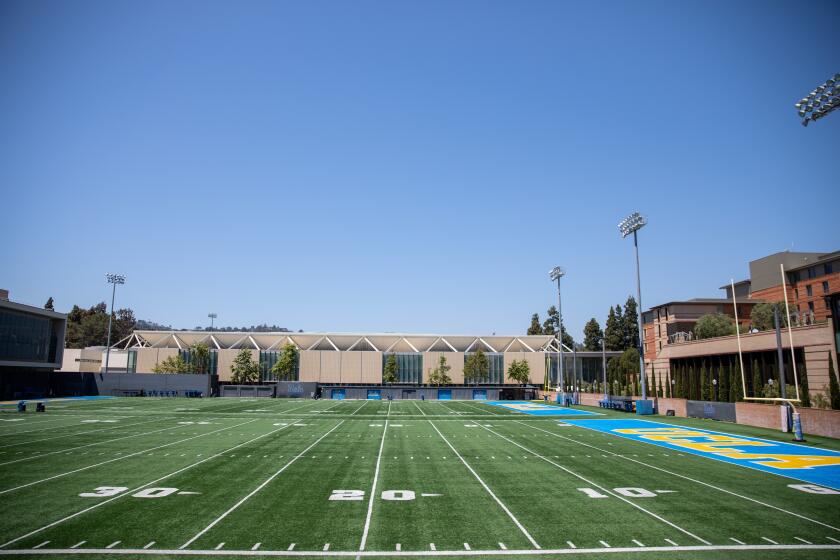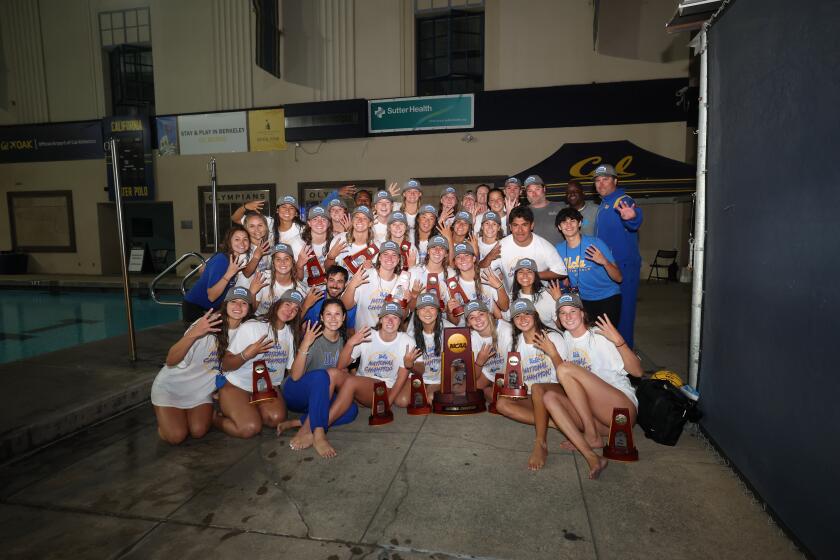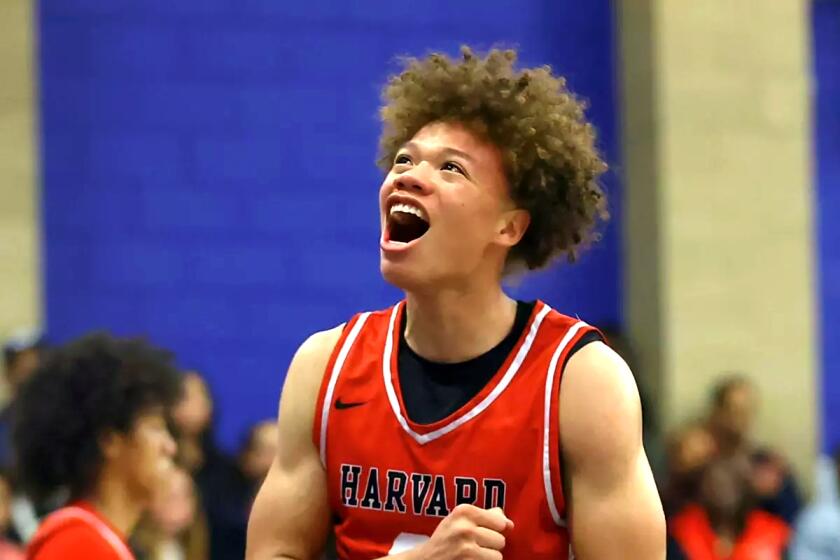UC Irvine’s Guerrero Is Easy Choice for UCLA
Choosing among three comparable finalists for athletic director, UCLA took the path of least resistance Thursday, hiring upbeat, outgoing Dan Guerrero, a former Bruin baseball player who in the last 10 years elevated UC Irvine into a thriving sports school.
Guerrero, 50, will be introduced at a news conference today and take over July 1 for Pete Dalis, who is retiring after 19 years in the position.
The other finalists, Boise State Athletic Director Gene Bleymaier and UCLA associate athletic director Betsy Stephenson, had vocal advocates and opponents in the athletic department and on a search committee headed by vice chancellor Pete Blackman.
Bleymaier, a former UCLA tight end, is a friend of Dalis and has close ties to the Bruin football program. Stephenson, Dalis’ top assistant, was a favorite of those associated with the non-revenue sports she supervised the last six years.
Guerrero, in contrast, is relatively unknown to many UCLA insiders and coaches despite his alumni status.
“Everybody who knows him says they like him, but around here, not many people know him,” said a Bruin administrator who declined to be identified. “That worked in his favor because there were strong feelings about [the other finalists], and Guerrero was below the radar in terms of department politics.”
That’s not to say Guerrero can’t play hardball. He was a second baseman at UCLA who batted .343 from 1970-73 and still has a strong arm, as Irvine Chancellor Ralph Cicerone discovered before tossing the honorary first pitch at the Anteaters’ baseball home opener in January.
“We played catch bare-handed to warm up my arm and the next day my hand was bruised and swollen,” Cicerone said.
The chests of both administrators were puffed with pride because the game marked the return of baseball at Irvine after a 10-year absence. The tireless Guerrero was key to resurrecting the sport, convincing a notoriously uninterested Irvine student body to pass a referendum in 1999 that adds $33 to registration fees each quarter.
The money has helped fuel $38 million of newly constructed and renovated facilities in the last four years. Similar facilities upgrades would be welcome at UCLA, a topic Guerrero undoubtedly discussed with Blackman and UCLA Chancellor Albert Carnesale during interviews.
Blackman, a 62-year-old former Bruin basketball player, wants to see 37-year-old Pauley Pavilion renovated before he retires. The project is in the discussion stage, and it will be incumbent on Guerrero to move it forward.
A $14-million renovation of the on-campus Acosta Training Center is set to take place over the next two years. Some at UCLA whisper that Guerrero could make a bold move and halt the project until more funds can be raised.
The current plan would improve weight and medical training facilities and add locker rooms and meeting rooms, but the renovation is less ambitious than recent projects at other Pacific 10 Conference schools.
“There is always room for improvement facilities-wise,” football Coach Bob Toledo said. “Look at what the schools in the Northwest have done. That’s what we need to do.”
Guerrero, who agreed to a five-year contract at $235,000 a year, is all ears.
“What any effective leader does is [identify] the leaders, talk to them and assess the program,” he said. “[I] have to find out what UCLA does well and what needs to be improved.”
More than facilities will require examining. The athletic department has been embarrassed by a series of NCAA violations and other crises, including the handicapped parking scandal in 1999 and the extra-benefits violation of star tailback DeShaun Foster last fall.
Also, the school’s signature program--men’s basketball--has not won a Pac-10 title in five years and is perceived by many as having underachieved in Coach Steve Lavin’s six seasons.
Although Guerrero fired 10 coaches in his first five years at Irvine, he probably will refrain from using the ax on Lavin or Toledo for at least a year. In fact, there is a strong feeling that only Blackman and Carnesale wield the power to fire a high-profile Bruin coach, and both men are said to be partial to Lavin and Toledo.
Change is slow in a department where all eight associate or assistant athletic directors besides Stephenson are UCLA graduates and have been employed there for 20 years or more.
In fact, few high-profile candidates showed interest in the opening because of the relatively low salary and perception that the athletic director lacks the power to make unilateral decisions on matters of importance.
To be sure, the challenges at UCLA are vastly different from those at Irvine, a commuter school of 21,500 that fields teams in 23 sports.
Besides resurrecting baseball, Guerrero’s chief accomplishment was hiring basketball Coach Pat Douglass in 1997. The Anteaters, who won only one game the season before Guerrero became athletic director, took the Big West Conference regular-season championship in 2001 and shared it this season.
There is no Anteater football team, but Guerrero’s lack of experience in that area does not bother Toledo.
“The athletic director’s job is to let the coaches coach and give them the weapons to get the job done,” he said. “I don’t think it matters that someone is from a school without a football team.”
It apparently didn’t concern Carnesale, who made Guerrero the first minority in UCLA athletic administration. He is one of four Latino athletic directors in Division I-A.
“He is a former Bruin athlete and it’s wonderful to welcome him home,” Carnesale said. “We look forward to him making his mark in the unmatched athletic tradition of this university.”
Guerrero is glad to move north. UCLA might be only about 50 miles from Irvine, but it is light-years ahead in athletic tradition.
“Having the chance to return to my alma mater and lead such a prestigious athletic program are the reasons I embrace this opportunity,” he said. “I commend the outstanding work my predecessors have done in guiding UCLA to the upper echelon of intercollegiate athletics, and I look forward to building upon the established excellence of the program.”
Therein lies his new challenge. Rather than launching sports from scratch and turning around woeful losers, he must now measure success in small increments because so many of the programs already are established powers.
There might be few days as satisfying as the one that came soon after he had turned Cicerone’s hand to cauliflower--the day he watched the baseball team he resurrected post its first victory.
The team Irvine beat? UCLA.
Go beyond the scoreboard
Get the latest on L.A.'s teams in the daily Sports Report newsletter.
You may occasionally receive promotional content from the Los Angeles Times.




